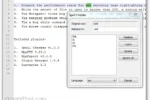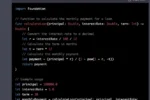Are you tired of using the same note-taking app and looking for something new? If so, you’re in the right place! Today, we’re diving into the world of amazing open-source alternatives to the popular app Obsidian. While Obsidian is great for keeping your notes organized and building a Personal Knowledge Management (PKM) system, it might not fit everyone’s needs. Don’t worry, I’ve found five awesome tools that are flexible, user-friendly, and perfect for helping you manage your ideas and projects. Let’s explore these exciting options together!
| Tool Name | Key Features | Strengths | Weaknesses | Best For |
|---|---|---|---|---|
| Notesnook | End-to-end encryption, native apps on all platforms, web clipper, task lists, offline mode, bidirectional linking. | User-friendly formatting, supports offline access, and multiple tabs. | None mentioned. | Personal Knowledge Management (PKM) needs. |
| Joplin | Cross-platform, supports markdown, web clipper, synchronization options. | Robust organization features, strong plugin support. | Outdated appearance; requires third-party themes for modern look. | Note-taking and organization. |
| AnyType | Local-first, intuitive block editor, templates, widgets, team wiki. | Combines privacy of Obsidian with features of Notion, versatile use cases. | None mentioned. | Creating diverse content types like wikis and project management. |
| Logseq | Graph-based management, outlining, nested lists, drag-and-drop. | Strong graph view integration, excellent for planning and brainstorming. | Small plugin ecosystem, but growing. | Structured thinking and organizing complex information. |
| Appflowy | Blocks, pages, databases, flexible content creation, AI integration. | Excellent for project management, rich templates, and flexible syncing. | None mentioned. | Handling personal and complex projects. |
Discovering Open-Source Alternatives to Obsidian
Obsidian is a fantastic tool for note-taking and building a system to manage knowledge, but it isn’t the only option out there. Many people prefer open-source software because it allows for more flexibility and user control. Luckily, there are several impressive alternatives that can help you organize your thoughts without the need to rely solely on Obsidian. In this article, we will explore five great open-source tools that can enhance your productivity.
Each of these alternatives has its own unique features and strengths that can cater to different needs. For instance, some tools focus on note-taking while others provide options for project management or collaborative work. By understanding the specific benefits of each tool, you can choose the best one for your personal workflow. Let’s dive into these alternatives and see what they offer!
The Benefits of Using Notesnook for Personal Knowledge Management
Notesnook is a powerful open-source tool that makes note-taking easy and secure. One of its standout features is end-to-end encryption, which ensures that your notes remain private and protected. This means that you can take notes without worrying about them being accessed by anyone else. Additionally, Notesnook works on various platforms like mobile and desktop, making it accessible wherever you are.
Another great aspect of Notesnook is its user-friendly interface. Unlike Obsidian, you don’t need to learn markdown right away; you can start writing and formatting your notes easily. It also includes helpful tools like task lists and note outlines, which can keep your thoughts organized. Whether you’re managing a project or jotting down ideas, Notesnook provides the tools to support your creativity.
How Joplin Enhances Your Note-Taking Experience
Joplin is designed with note-taking in mind, making it an excellent choice for those looking to capture ideas quickly. One of its key features is its ability to synchronize notes across different platforms. This means that you can access your notes from your computer, phone, or tablet without missing a beat. With Joplin, you can stay organized regardless of where you are.
Moreover, Joplin allows you to organize your notes with tags and notebooks, helping you find what you need easily. Although some users find its appearance outdated, the strong plugin system means you can customize it to suit your personal style. Overall, Joplin offers a practical solution for anyone serious about note-taking and organization.
Exploring the Versatility of AnyType
AnyType is a versatile tool that stands out by combining features from both Obsidian and Notion. It allows users to create a variety of documents, from personal notes to team wikis, making it perfect for different use cases. With AnyType, all your data is stored locally on your device, ensuring privacy and security. This feature is especially appealing to users who prioritize keeping their information safe.
In addition to its privacy features, AnyType offers an intuitive block editor and a wide range of templates. This makes it easy to create organized notes, task lists, and even project boards. Whether you’re tracking habits or planning projects, AnyType provides the flexible tools you need to stay on top of your tasks and ideas.
The Unique Features of Logseq for Structured Thinking
Logseq is an interesting tool that focuses on structured thinking and outlining. This makes it a great option for users who need to organize complex information visually. One of its standout features is the graph view, which shows the connections between your notes in a clear and engaging way. This can help you see how different ideas relate to each other, enhancing your understanding of the material.
Another great aspect of Logseq is its ability to create nested lists, which allows for detailed organization of your thoughts. You can easily expand or collapse sections, making it easier to focus on what’s important at any moment. While it may not have as many plugins as other tools, Logseq is rapidly growing and adapting to users’ needs.
Maximizing Project Management with Appflowy
Appflowy is an excellent open-source alternative for those looking to manage projects effectively. Unlike Obsidian, which is primarily focused on note-taking, Appflowy offers features that help you organize tasks and collaborate on projects. It includes blocks, pages, and databases that allow for flexible content creation. This flexibility makes it easier to visualize and track your projects.
Moreover, Appflowy’s AI integration is a game-changer. You can use various language models to automate tasks and streamline your workflow. This feature helps you complete tasks more efficiently, making it an ideal choice for busy individuals or teams. With its rich templates and easy-to-use interface, Appflowy ensures you can stay organized while tackling complex projects.
Understanding the Benefits of Open-Source Alternatives
Open-source alternatives to popular software like Obsidian offer distinct advantages for users seeking flexibility and customization. Unlike proprietary software, these tools allow users to access and modify the source code, enabling a personalized experience tailored to individual needs. This adaptability fosters innovation within the software, allowing developers and users to collaborate and enhance features that align with their workflows. Furthermore, open-source software often comes with no licensing fees, making it a cost-effective option for budget-conscious users.
Another significant benefit of open-source alternatives is the emphasis on community support. Users can connect with other enthusiasts, share insights, and collaborate on improvements. This vibrant ecosystem of contributors ensures that any bugs are quickly addressed and features are continually refined. Additionally, many open-source projects prioritize user privacy, giving individuals more control over their data compared to closed-source solutions. This transparency is especially appealing to those concerned with data security and ownership.
Key Features to Look for in Note-Taking Software
When evaluating open-source alternatives to Obsidian, it’s essential to consider the key features that will best support your note-taking and knowledge management needs. Look for tools that offer cross-platform compatibility, ensuring seamless access to your notes across devices. Features like markdown support, robust organization options, and intuitive user interfaces can significantly enhance your productivity. Additionally, consider the availability of plugins or extensions that can further customize your experience and streamline your workflow.
Another critical aspect to consider is synchronization options. A reliable note-taking tool should allow you to sync your notes across various cloud services or local storage solutions. This flexibility ensures that your data is always accessible and backed up, preventing potential data loss. Furthermore, features like encryption and end-to-end security are vital for protecting sensitive information, making it crucial to choose an alternative that prioritizes your data privacy.
Comparing User Experiences: Community Insights
User reviews and community feedback play a crucial role in determining the effectiveness of open-source note-taking tools. Engaging with forums, social media groups, and dedicated communities can provide valuable insights into how these applications perform in real-world scenarios. Users often share tips, tricks, and best practices that can enhance your experience. Additionally, community discussions can reveal common challenges and solutions, helping you to navigate any potential learning curves associated with new software.
Furthermore, many open-source projects have active development communities that solicit user feedback for future updates. This collaborative approach not only fosters a sense of belonging among users but also ensures that the software evolves in a way that meets the needs of its community. By participating in these discussions, you can stay informed about upcoming features, improvements, and even contribute to the project’s direction, making your experience with the software more rewarding.
Maximizing Your Productivity with These Tools
To get the most out of your open-source note-taking software, it’s essential to adopt effective strategies that enhance your productivity. Start by organizing your notes in a manner that reflects your workflow. Utilize tags, folders, or categories to create a logical structure that makes it easy to locate information. Regularly review and update your notes to keep your knowledge base relevant and useful. Setting specific goals for your note-taking can also help maintain focus and ensure that your efforts align with your broader objectives.
Additionally, take advantage of the unique features offered by each tool to streamline your processes. For instance, using templates for recurring tasks or projects can save time and improve consistency in your note-taking. Explore the plugin ecosystem to discover new functionalities that can automate tasks or enhance your workflow. By integrating these tools into your daily routine, you can create a more efficient and effective knowledge management system that supports your personal and professional growth.
Frequently Asked Questions
What is an open-source note-taking app?
An **open-source note-taking app** is software that anyone can use and modify. This means people can help improve it and share their changes, making it better for everyone.
Why should I use an alternative to Obsidian?
You might choose an alternative to **Obsidian** because other apps can offer different features, easier use, or better privacy. Some alternatives are more flexible for specific needs, like project management.
What is Notesnook and what makes it special?
**Notesnook** is an open-source app that keeps your notes safe with **encryption**. It works on all devices and has easy formatting tools, making it simple to use without needing markdown knowledge.
How does Joplin help me organize my notes?
**Joplin** helps you organize notes by allowing you to create **folders** and use tags. It also syncs with services like **Dropbox**, so you can access your notes anywhere.
What unique features does AnyType offer?
**AnyType** is special because it lets you store all your data on your device. You can create not just notes but also **wikis**, project boards, and even habit trackers, all in one place.
Why is Logseq good for planning and brainstorming?
**Logseq** is great for planning because it lets you create **nested lists** and visually see how your notes connect through a **graph view**. This helps in organizing ideas clearly.
How can Appflowy help with project management?
**Appflowy** is helpful for managing projects because it has tools for creating **pages** and **databases**. It also uses AI to assist with tasks, making project management easier and faster.
Summary
The content explores five open-source alternatives to Obsidian, catering to various note-taking and personal knowledge management needs. It highlights Notesnook for its end-to-end encryption and user-friendly features, Joplin for robust note organization despite its outdated interface, and AnyType for its versatility in combining privacy and functionality. Logseq is noted for its graph-based approach and structured thinking, while Appflowy excels in project management with its flexible content organization. Each tool is presented with its strengths and potential limitations, empowering users to choose the best fit for their workflow and preferences.







